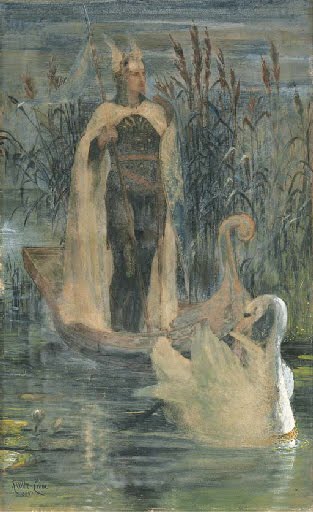settings
In Search of Lost Time [volume 1] vocabulary
423 vocabulary words, including people, places, music, artists, etc.
help & settings
[x]
-
Lohengrin
-
► definition
Definition:hero of a German 13th-century poem; son of Parzival, and a Knight of the Grail; carried by a swan to Brabant he delivered and married the Princess Elsa; subsequently returning from war against the Saracens, she asked him of his origin; he told her, and was at once carried back again by the swan. Wagner adapted the story in his opera "Lohengrin."Rev. James Wood. The Nuttall Encyclopedia (1907) painting: By Walter Crane - Pre Raphaelite Art, Public Domain, https://commons.wikimedia.org/w/index.php?curid=11617598sound file: public domain, Wagner's Lohengrin (sample)
painting: By Walter Crane - Pre Raphaelite Art, Public Domain, https://commons.wikimedia.org/w/index.php?curid=11617598sound file: public domain, Wagner's Lohengrin (sample)
► uses
Uses:
[Peach Melba] often performed a role in a Wagner opera (Lohengrin) in which she rode a large swan float across the stage. Escoffier loved this particular scene and created a dish in Melba's honor of peaches, vanilla ice cream, and berries, presented on a swan ice sculpture. The singer [...] ate if often, perhaps too often. Melba began to put on weight and [therefore] Escoffier then came up with a low-calorie dish for the singer - Melba toast.
Don Voorhees. Why Does Popcorn Pop?, p.189 (1995)
---
They sang part-song music, from “Sweet and Low” to a “Lohengrin” chorus. And with a will, with finesse, with a pianissimo over which the endless drone of the electric fan could be clearly distinguished, and a fine, free fortissimo that would have enchanted Wagner! They brought the house down every time.
Arnold Bennett. Paris Nights and Other Impressions of Places and People (1913)
---
PROFESSOR RUBEK: I meant swans, yes. And I remember that I fastened a great furry leaf to one of the swans. It looked like a burdock-leaf—
IRENE: And then it turned into Lohengrin's boat—with the swan yoked to it.
Henrik Ibsen. When We Dead Awaken.

